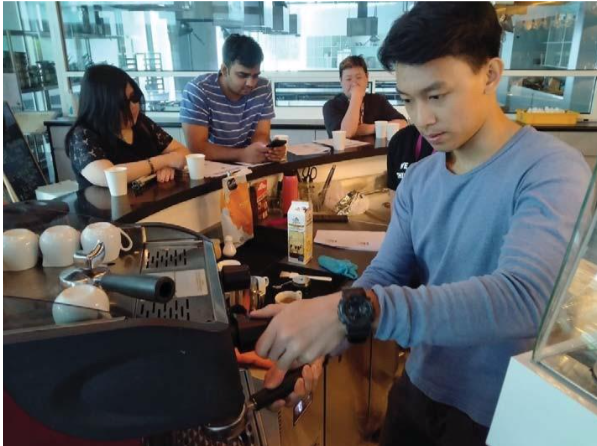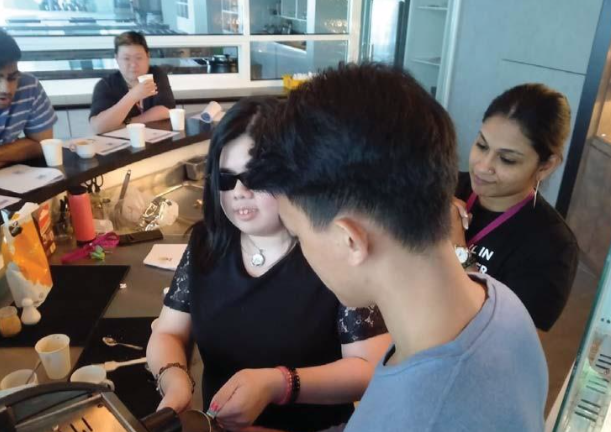MIRM Collaborates with Reliance College to Support Divergent Learners

On September 9, 2022, the Make It Right Movement (MIRM) collaborated with Reliance College to launch a unique Barista Training programme designed specifically for divergent learners; individuals with disabilities who often face significant barriers to employment. The programme is part of MIRM’s broader Immersion Programme, which aims to provide people with disabilities (PWDs) with the practical skills they need to transition into the workforce and lead more independent lives.
The Barista Training session, led by Ms. Yogeswari of Reliance College, focused on equipping participants with the knowledge and hands-on experience required to work as professional baristas. This initiative is not just about making coffee—it’s about empowering individuals with the skills, confidence and opportunities to succeed in a competitive job market.
The Importance of Skill Development for People with Disabilities
Many companies still hold misconceptions about their abilities, leading to limited opportunities in the workforce. To break down these barriers, MIRM is committed to offering specialised training programmes, like the Barista Training initiative, that provide individuals with disabilities the tools they need to succeed in various professional environments.
Barista training, in particular, offers a practical entry point into employment, as the hospitality industry continues to grow and demand for skilled workers remains high. By learning the art of coffee-making, participants gain both technical skills and customer service experience, increasing their employability in cafes, restaurants and hotels.
The training was an interactive and immersive experience that allowed participants to get a real feel for what it’s like to work in a coffee shop environment. The programme was structured to provide both theoretical knowledge and practical experience, with a focus on ensuring that every participant gained the confidence to work independently as a barista.
Some of the key components of the training included:
Learning Coffee Fundamentals:
The training began with an introduction to coffee, covering its history, different types of coffee beans and the coffee-making process. Participants learned about the importance of selecting the right beans and how the brewing process affects the flavor and quality of the final cup
Hands-On Coffee Preparation:
Participants were given the opportunity to work with professional coffee machines and equipment, learning how to prepare various types of coffee drinks such as espressos, lattes, cappuccinos and Americanos. Under the guidance of Ms. Yogeswari, they practiced operating coffee machines, frothing milk and understanding the precise techniques required to create perfect coffee beverages.
Customer Service Skills:
In addition to learning the technical aspects of coffee-making, the participants were trained in customer service etiquette. This included how to take orders, interact with customers and maintain a welcoming and professional demeanor in a busy café setting. Customer service is a key component of the hospitality industry and these skills are transferable across various roles, enhancing the participants’ employability.
Confidence Building:
Throughout the programme, a strong emphasis was placed on building the participants’ confidence. For many, this was their first time engaging in professional training and the supportive environment allowed them to experiment, ask questions and develop their skills at their own pace. The practical experience gave participants a sense of accomplishment and prepared them to apply their new skills in a real-world setting.
A Collaboration with Impact
The partnership between MIRM and Reliance College reflects both organisations’ commitment to creating inclusive opportunities for people with disabilities. Through this Barista Training initiative, the two organisations aim to not only provide participants with a specific set of job skills but also challenge societal perceptions of what people with disabilities can achieve in the workforce.
By working together, MIRM and Reliance College are helping to create a pathway for divergent learners to gain meaningful employment in the hospitality industry. The Barista Training is just one example of how skill development can empower people with disabilities, equipping them with the tools they need to lead independent and fulfilling lives.
Success Stories and Employment Opportunities
The Barista Training program has already yielded positive results, with several participants expressing interest in pursuing careers in the hospitality industry. For many, this training was their first exposure to professional skills training and the sense of achievement they gained from mastering the art of coffee-making was evident.
Several participants are expected to secure internships and job placements in cafes and restaurants across Kuala Lumpur, with the support of MIRM and Reliance College. As the hospitality industry continues to grow, the demand for skilled baristas remains high and participants who complete the training programme will have a competitive edge in securing employment.
Breaking Down Barriers: Promoting Inclusive Employment
One of the key goals of the Barista Training initiative is to break down the barriers that prevent people with disabilities from accessing employment opportunities. By providing specialised training, MIRM and Reliance College are helping participants overcome the stigma and misconceptions that often limit their chances of finding work.
Through partnerships with businesses that value diversity and inclusion, MIRM is working to create more job opportunities for people with disabilities. By showing employers the unique skills and talents that PWDs bring to the table, MIRM aims to shift the narrative and promote a more inclusive workforce.
As MIRM continues to expand its Immersion Programme and collaborate with organisations like Reliance College, the hope is that more people with disabilities will be empowered to enter the workforce, contribute meaningfully to their communities and lead independent lives.
